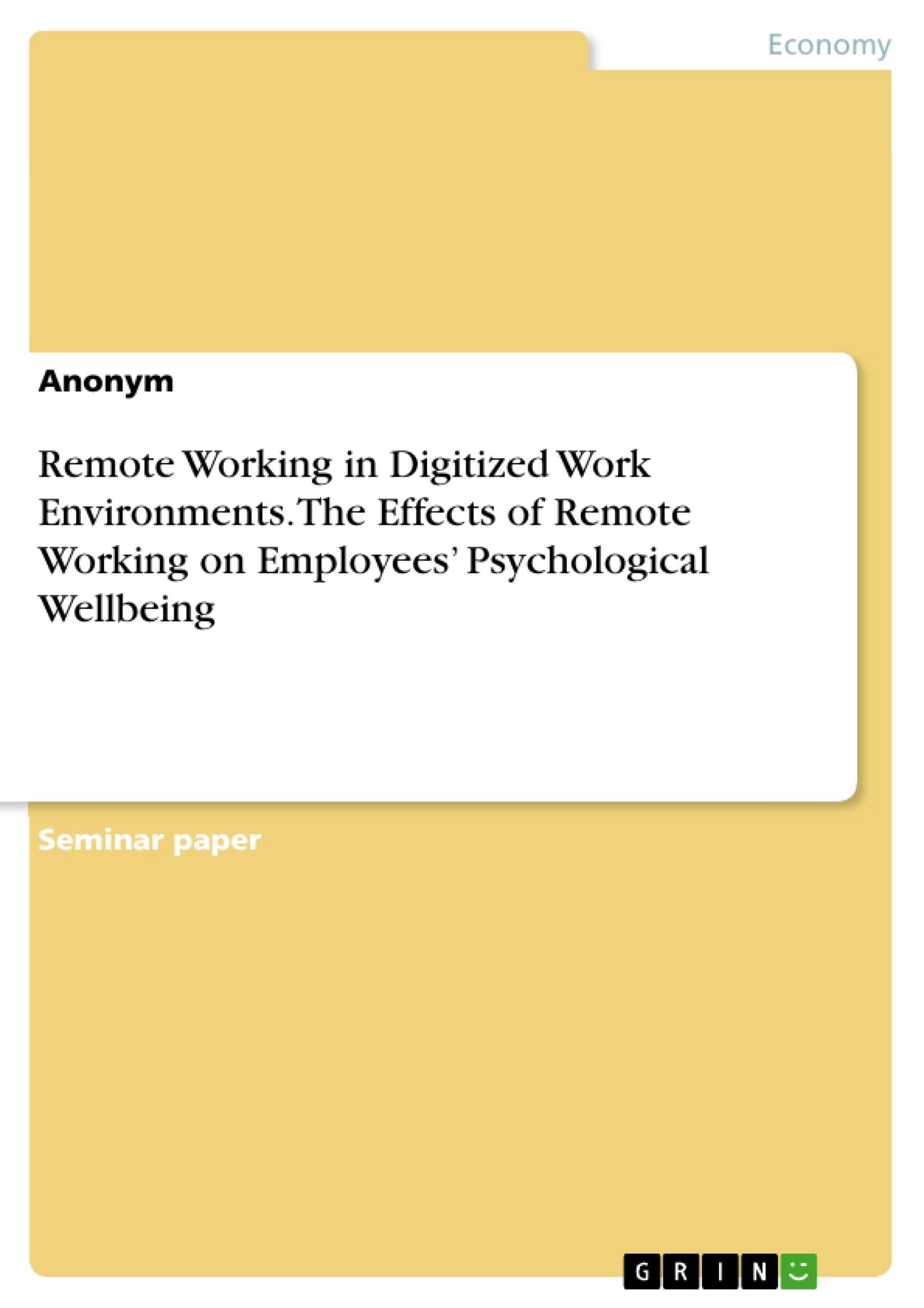In this systematic literature review, we analysed the impact of remote working on employees’ psychological well-being, with the aim to identify essential job and personal resources regarding remote working and to develop recommendations for organizations. A search was undertaken in two databases, Web of Science and Google Scholar. In this review a total of 365 papers were identified and 18 quantitative, seven qualitative and one mixed method studies were included.
Workplaces have a major influence on employees’ quality of life and the ability to impact their well-being. The altered working conditions resulted from the digitalization are affecting employees’ well-being. Additionally, COVID-19 has transformed the approach to the concept of work, and an important aspect that disruptively emerged during the pandemic is remote working. Decisions on how to promote employees’ well-being whilst the new work arrangements need to be based on available evidence to optimise employees’ outcomes.
Inhaltsverzeichnis (Table of Contents)
- 1. INTRODUCTION
- 2. WELL-BEING AND EFFECTS OF REMOTE WORKING
- 2.1 Remote working
- 2.2 Well-being
- 2.3 Job Demands-Resources (JDR) model
- 2.4 Studying impact
- 3. METHODOLOGICAL APPROACH
- 3.1 Selection criteria and search strategy
- 3.2 Literature selection
- 4. RESULTS
- 4.1 Affective related outcomes
- 4.2 Interactions and isolation
- 4.3 Autonomy and worktime control
- 4.4 Gender differences in well-being outcomes related to remote work
- 5. DISCUSSION
- 5.1 Conclusion and interpretation
- 5.2 Implications for practice
- 5.3 Study limitations
Zielsetzung und Themenschwerpunkte (Objectives and Key Themes)
This systematic literature review aims to analyze the impact of remote working on employees' psychological well-being. The study seeks to identify essential job and personal resources related to remote work and develop recommendations for organizations.
- The impact of remote working on employee well-being
- Job and personal resources affecting well-being in remote work environments
- Recommendations for organizations to optimize employee outcomes in remote work
- The role of digitalization and emerging technologies in shaping work patterns
- The changing nature of work-life balance in the context of remote work
Zusammenfassung der Kapitel (Chapter Summaries)
The introduction provides an overview of the increasing prevalence of remote work in a digitalized world, highlighting its relevance and impact on employee well-being. Chapter 2 delves into the concepts of well-being, remote working, and the Job Demands-Resources (JDR) model, setting the theoretical framework for the study. Chapter 3 outlines the methodological approach, detailing the selection criteria, search strategy, and literature selection process used in the review. Chapter 4 presents the findings of the review, exploring the effects of remote working on affective outcomes, interactions and isolation, autonomy and worktime control, and gender differences in well-being outcomes. The discussion chapter, excluding the conclusion, focuses on interpreting the findings, outlining implications for practice, and acknowledging study limitations.
Schlüsselwörter (Keywords)
This review focuses on the impact of remote working on employees' psychological well-being. Key concepts include remote working, teleworking, well-being, psychological health, stress, job demands, job resources, and the Job Demands-Resources (JDR) model.
Frequently Asked Questions
How does remote working affect employee well-being?
The review analyzes affective outcomes, showing that while remote work offers autonomy, it can also lead to isolation and blurred work-life boundaries.
What is the Job Demands-Resources (JDR) model?
It is a theoretical framework used to understand how job demands (like workload) and job resources (like autonomy) impact employee stress and well-being.
Are there gender differences in remote work well-being?
Yes, the study explores how remote work impacts men and women differently, often related to domestic responsibilities and work-time control.
What role did COVID-19 play in the shift to remote work?
The pandemic disruptively emerged as a catalyst that transformed the concept of work and made remote working a standard for many digitized environments.
What can organizations do to promote psychological health?
Recommendations include providing essential job resources, fostering interactions to prevent isolation, and optimizing work arrangements based on evidence-based outcomes.
- Quote paper
- Anonym (Author), 2022, Remote Working in Digitized Work Environments. The Effects of Remote Working on Employees’ Psychological Wellbeing, Munich, GRIN Verlag, https://www.grin.com/document/1320838



